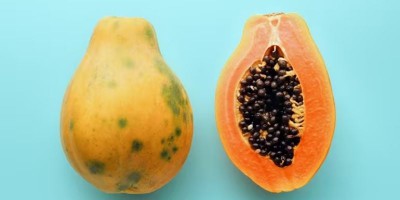
Do you find yourself constantly hitting a golf ball into the sand trap or missing that hole-in-one by just a few feet? If so, it might be time to adjust your diet. Incorporating papaya into your regular meals can help boost performance and improve your golf game.
Packed with essential vitamins, minerals, and enzymes, this tropical fruit is known for its many health benefits ranging from digestion support to enhanced eye health. Learn how including papaya in your diet can make you a better golfer!
What is Papaya
Papaya is a tropical fruit native to Central and South America. It has an orange-yellow flesh that is sweet, juicy, and rich in flavor. The outer skin of the papaya can range from green to yellow, depending on its ripe.
Papayas are packed with antioxidants and have many health benefits, including improved digestion, cardiovascular health, anti-inflammatory properties, and immunity.
Health Benefits of Papaya

1. Improved Digestion:
Papayas contain an enzyme called papain which helps break down proteins and prevent bloating, gas, and indigestion. It also helps improve the absorption of nutrients from food.
2. Better Cardiovascular Health:
Eating papaya can help reduce inflammation and bad cholesterol levels, thus protecting against heart disease.
3. Immune System Support:
Papaya is rich in vitamin C, which helps boost the immune system. It also contains other compounds, such as lycopene and beta-carotene, to help fight infection.
4. Skin Health:
Eating papaya can help improve skin health due to its high content of Vitamin A, which helps promote cell growth and regeneration. It also contains antioxidants that help protect the skin from damage caused by free radicals.
5. Improved Eye Health:
Papaya is packed with lutein and zeaxanthin, two compounds that help protect your eyes against age-related macular degeneration and other vision-related problems.
6. Stronger Bones:
Papaya is a great source of Vitamin K which helps build and maintain strong bones. It also contains calcium, magnesium, and phosphorus, which all help keep your bones healthy.
7. Weight Loss:
Papaya is low in calories but high in fiber which helps you feel fuller for longer. Eating papaya can help keep your appetite in check and prevent overeating.
8. Reduced Stress:
Papayas are full of folate, vitamin B6, and magnesium, which all help reduce stress levels and promote relaxation. Eating papaya can also help improve sleep quality, thus leading to a better overall mood.
9. Reduced Risk of Cancer:
The papaya antioxidants can help protect cells from oxidative damage, reducing the risk of certain cancers.
These are just a few of the many health benefits of eating papaya. Eating this delicious fruit regularly can help improve your overall health and well-being.
How papaya supports healthy digestion

Papaya is an excellent source of dietary fiber, providing up to 12% of the recommended daily intake per serving. This fiber helps keep the digestive system running smoothly by promoting regularity and helping food move through the intestines efficiently.
In addition, papaya contains digestive enzymes such as papain that aid in breaking down proteins for easier digestion.
Papaya is also packed with essential vitamins and minerals for healthy digestion. It is particularly high in Vitamin C, which helps to keep the lining of the digestive tract strong and prevents damage from free radicals.
Moreover, papaya contains potassium, magnesium, and phosphorus, which support efficient nutrient absorption.
Finally, papaya may help reduce inflammation in the digestive system by providing antioxidants such as lycopene and beta-carotene. These compounds neutralize the effects of oxidative stress, helping to keep inflammation at bay and reduce discomfort in the stomach and intestines.
Different ways to enjoy papaya in your diet
Papaya is a delicious and versatile fruit that can be enjoyed in various ways, making it an ideal addition to any diet. There are plenty of benefits to adding papaya to your diet, from its high level of antioxidants that help protect against degenerative diseases to its many vitamins and minerals that promote good health. Here are some different ways to enjoy papaya in your diet.
1. Fresh Papaya:
Enjoying freshly cut papaya is the most traditional way to enjoy this delicious fruit. To prepare, cut the papaya lengthwise and scoop out the seeds. The flesh can be eaten as-is, used in salads or smoothies, or cooked into various dishes such as stir-fries or desserts.
2. Papaya Juice:
Papaya juice is a great way to get the benefits of papaya without having to cut it up and prepare it yourself. It's also a refreshing beverage that can be enjoyed anytime. Look for freshly-squeezed papaya juice, or try out some bottled varieties at your local grocery store.
3. Dried Papaya:
Dried papaya is a convenient way to get the taste and benefits of papaya without extra fuss. You can find dried papaya in most health food stores or online, and it's great for adding to trail mixes, granola bars, cereal, yogurt, or smoothies. It's also a great snack to keep for when hunger strikes.
Tips for purchasing and storing fresh papayas
When shopping for fresh papaya, look for one that is firm, unblemished, and has an even color. Avoid green or overly soft fruits as these are unripe and may not have the rich flavor of ripe fruit.
Keep your papaya in a paper bag at room temperature to speed up the ripening process until it becomes fragrant and slightly soft. To store ripe papaya, keep it in the refrigerator for up to one week.
Papayas are rich in beneficial vitamins and minerals, making them a nutrient-dense addition to any diet. They are an excellent source of vitamin C that helps support immunity and skin health; they also contain fiber, which helps regulate digestion, and potassium, which helps regulate blood pressure.
In addition, papayas are a source of the powerful antioxidant lycopene, helping to protect cells from free radical damage. Enjoy them fresh, in smoothies, or in salads for a nutritious and delicious addition to your meals!
FAQs
Is papaya good for females?
Yes, papaya is a great fruit to eat for female health. It is rich in antioxidants and vitamins such as A, C, E, and several B vitamins. Papaya also contains dietary fiber, which can help digestion and reduce the risk of constipation or other digestive issues. The potassium in papaya helps regulate blood pressure levels which is especially beneficial for women.
What is the best time to eat papaya?
Papaya is best eaten once it has ripened, as it will be sweet and juicy. It can also be eaten when slightly underripe and firm, providing a tangy flavor. Papaya should always be stored at room temperature to ripen evenly.
Is papaya good for kidneys?
Yes, papaya is a great fruit for kidney health. It contains diuretic properties that can help flush out kidney and urinary tract toxins.
Papaya also helps reduce inflammation in the kidneys and regulate electrolyte balance, which both work to improve overall kidney functioning. Its high vitamin C content also helps detoxify the liver, aiding in proper kidney health.
Conclusion
In conclusion, papaya offers a wide range of health benefits. It is high in fiber and beta-carotene, helping to improve digestion, reduce inflammation, and protect the body from disease.
Papaya is also rich in Vitamin C, which can help boost immunity and fight off infection. Furthermore, its natural enzymes can aid in skin care and digestion. Eating papaya regularly can help keep your body healthy and strong.
Related pages
Migraine: How a poor night's sleep may trigger headaches
Share on PinterestResearchers have looked into exactly how close sleep is tied to migraine headaches

Type 2 diabetes: Does weight loss really send it into remission?
Share on PinterestWhat clinical trials tell us about diabetes remission may not hold up in real-worl

8 Wintertime Skin Conditions to Look Out For
During the winter months, cold temperatures can cause the skin to lose moisture.This lack of moistur

Turmeric for Indigestion: Supplement May Work as Well as Omeprazole
New research suggests turmeric may work just as well as a common over-the-counter medication to help

Nearly Half of Heart Attack and Stroke Survivors Don't Know What 'Bad' Cholesterol Is
New research found that a majority of heart attack and stroke survivors report having high cholester

These Lifestyle Factors Could Help Lower Risk of Depression
New research found seven lifestyle factors that may help reduce the risk of depression: alcohol inta

